Reviews for September 23rd, 2009
Capitalism: A Love Story
Directed by Michael Moore.

This mildly entertaining, but unenlightening and poorly-researched documentary tackles the issue of how capitalism caused the financial crises in 2008. The difference between the rich and the poor has been getting greater and greater, so there’s virtually no more middle class left. Banks and credit card companies target college students once they arrive in their freshman year, so many of the naïve students end up accruing a large debt, eventually, which they might still be trying to pay off after college. Not surprisingly, a homeowner doesn’t seem too happy once he’s evicted when the bank takes his home when he can no longer pay his debts otherwise. Commercial airline pilots receive such low wages compared to those higher up on the corporate ladder that they’re forced to find additional jobs and/or use food stamps. Companies such as Proctor and Gamble take out life insurance policies on their employees and make a lot of money once the “dead peasants” die---even more than when they’re alive. Director Michael Moore once again shines a light on a very timely and important subject matter in the interest of public welfare, but he has pretty much squandered his opportunity to get to the root of the problem and to find practical solutions. He’s great at bringing out absurdity and humor throughout his interviews, such as when he asks a banker to define the word “derivative,” but the banker can barely put coherent sentences together. Another laughter-inducing scene is when Moore puts crime scene tape around the entrances of banks. Unfortunately, he takes a simple-minded approach to the issue of capitalism and, after the first hour, the message about capitalism’s horrors gets pounded over and over into the audience’s mind that it become tedious. Does he seriously think he can find even a modicum of accountability in the greedy world out there? The much sharper documentary, The Corporation or even Maxed Out and American Casino, covered similar issues with much more thoroughness and revelations. Moore mentions the term “democracy,” but he doesn’t even definite or describe it for the vast majority of the American public who use the term, but don’t truly understand what it really means and implies. In the provocative book The End of America, author Naomi Wolf does a much better job of not only exploring the meaning of “democracy,” but providing examples of how George W. Bush essentially closed down our democracy by using fascist tactics which echo the tactics used by dictators throughout history, such as Hitler, Pinochet and Mussolini. Moore is either too incompetent, cowardly or a combination of both, to address the problem that most of the public lacks autonomy and suffers from gullibility, naiveté and simple-mindedness in their understanding of politics, banking and other important areas (such as the health industry) where greed and ego blend with corruption and propaganda to form a brew that’s quite toxic for public welfare and, above all, for evolution itself. At a lengthy running time of 2 hours and 7 minutes, Capitalism: A Love Story manages to be mildly entertaining and occasionally funny, but often poorly researched, repetitive, parochial, and unenlightening. Number of times I checked my watch: 3 Released by Overture Films. Opens at the Angelika Film Center and Lincoln Plaza Cinemas. Opens nationwide on October 2nd. 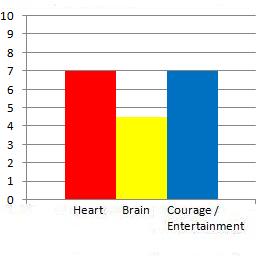
In Search of Beethoven
Directed by Phil Grabsky.
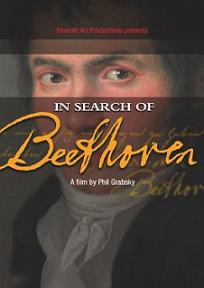
This illuminating and engaging documentary, narrated with a soothing voice by Juliet Stevenson, focuses on the life and work of Ludwig van Beethoven, the famous classical music composer and pianist. He was born in the town of Bonn, Germany in 1770 and developed his passion for music at a very early age while his father, a music teacher, instructed him. He struggled to support himself financially at first, but he never gave up. When he moved to Vienna, he gradually gained his fame as a composer. Many wealthy individuals, such as, Archduke Rudolph, Count Ferdinand von Waldstein and Prince Carl Lichnowsky, recognized his amazing talents and became his patron. Anyone who’s even remotely familiar with the life of Beethoven knows that he lost more and more of his hearing through time until he become deaf, yet he continued to compose music. It’s interesting, though, that despite that he was such a gifted composer and intelligent man with such much passion, he never was able to settle down with a woman whom he truly loved. His inner frustrations could be felt through his music. Director Phil Grabsky, who previously directed the documentary In Search of Mozart, blends Beethoven’s music with readings of his letters as well as interviews with experts, such as musicians and historians, who give their fascinating interpretations of Beethoven’s life and music. Those who are interviewed speak articulately and in ways that can be easily-t0-follow for those unfamiliar with Beethoven and his music. Most importantly, this documentary doesn’t bombard the viewer with facts about Beethoven’s life nor does it provide a simplified, reader’s digest version, but it provides chronological information and analyzes it along with his music in a way that allows for you to grasp precisely what makes Beethoven such a unique, talent and integral music composer whose music is still significant to this very day. At a lengthy running time of 2 hours and 19 minutes, In Search of Beethoven manages to be a well-researched documentary that’s equally illuminating and captivating. Number of times I checked my watch: 1 Released by Seventh Art Productions. Opens at the Cinema Village. 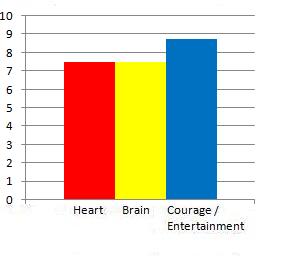
Irene in Time
Directed by Henry Jaglom.
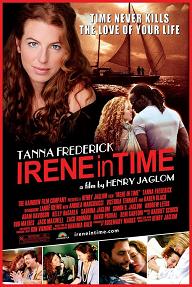
Irene (Tanna Frederick), a young, single woman works as a singer while living in Los Angeles. She still hasn’t overcome the death of her father whom she has always looked up to as the ideal kind of man she wants to meet. When it comes to her dating skills, she’s often repels her dates away because she projects herself as being too desperate and a little bizarre. For example, while out on a date with an architect, she asks him silly questions and tells him stupid suggestions which makes him feel uncomfortable. The more she tries to figure out why she kind seem to find the right guy, the more she realizes that her problems are deeply rooted in her relationship with her beloved father. Will she perhaps find true love and settle down with Mikey (Jack Maxwell), a new guy she met? Or perhaps there’s something going on between her and her music producer, Jakun (Lanre Idewu)? While digging into her father’s past, she discovers that he had a secret love affair with a woman, so, soon enough, she travels to meet the mistress, Helen (Andrea Marcovicci), who’s now a cabaret singer. Irene’s image of her father becomes tarnished as she discovers more secrets, which won’t be revealed here. Tanna Frederick delivers a lively, warm performance as Irene, but the dialogue written by writer/director Henry Jaglom sounds so stilted with contrived scenes that Irene, or any of the other characters, actually comes to life. Irene’s neurotic behavior gets irritating very quickly as you’re often wondering what it would take for her to finally grow up. Perhaps if Jaglom had written her character as a teenager coming-of-age rather than as a woman in her thirties, she’d be somewhat more believable, especially when it the ways that she and her friends talk to one another. On a positive note, Jaglom includes a very thoughtful and well-chosen musical soundtrack with lyrics that add a modicum of depth to the film, although not nearly enough to make it truly engrossing or insightful. Irene in Time, at a running time of 1 hour and 35 minutes, is too contrived, sophomoric and unmoving, despite a lively soundtrack and a radiant performance by the genuinely beautiful Tanna Frederick. Number of times I checked my watch: 4 Released by Rainbow Releasing. Opens at the Quad Cinema. 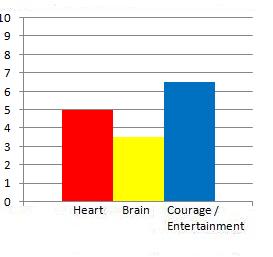
Main Page
Alphabetical Menu
Chronological Menu
______________________________________________________
|






